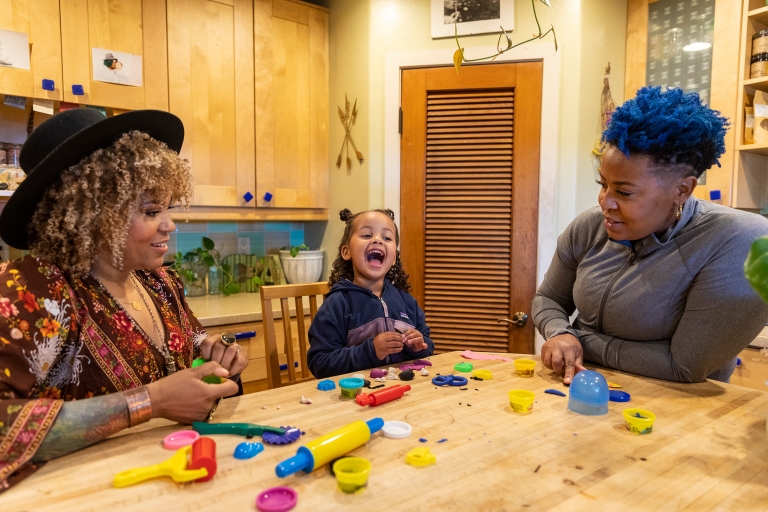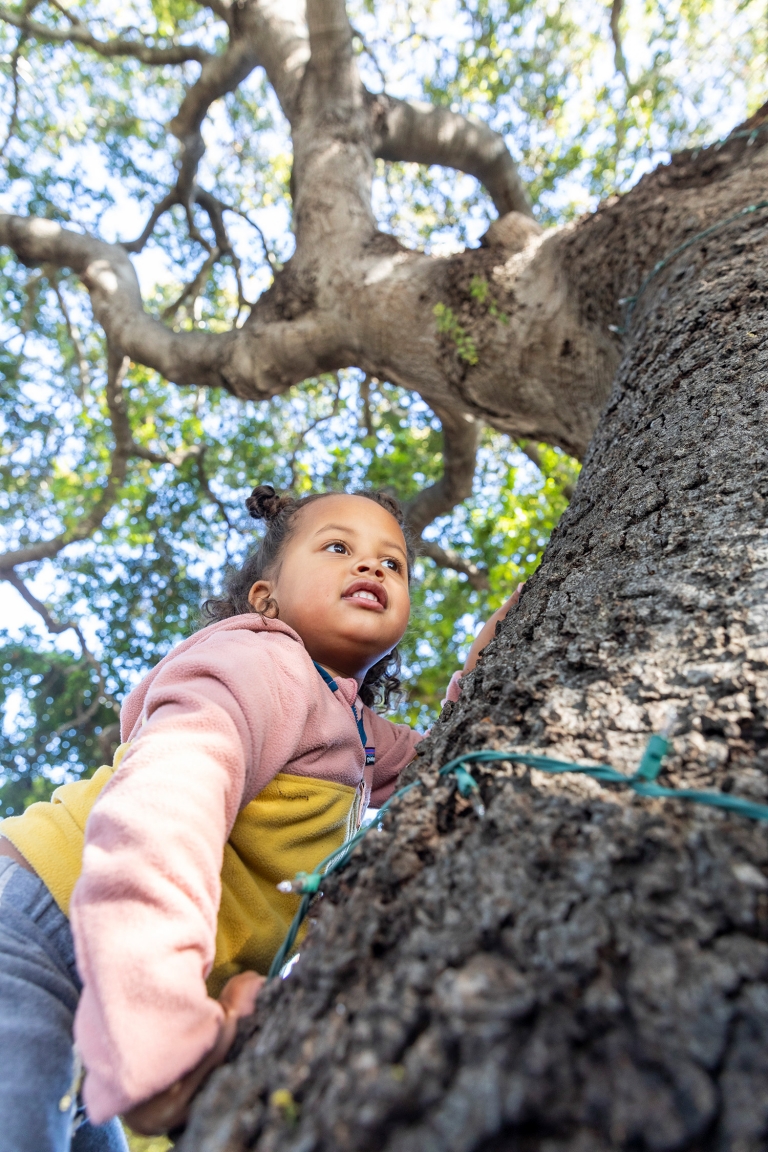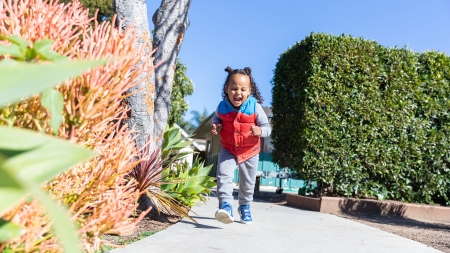A Quest for Nature
Ashe and Christin Brown are parents to their 3-year-old daughter, Quest, whom they want to raise with an appreciation for the diversity of the natural world.
All photos by Keri Oberly
Ashe and Christin Brown don’t mind being noticed.
“Christin has bright blue hair, and I have this giant blond Afro. We stand out everywhere we go,” says Ashe. “We made a point to never conform, change our looks or shy away from our Blackness as if we didn’t belong. As a result, I think people sometimes want to know, who are these two?!” says Ashe.
Though their days are spent selling teas, tinctures and herbal remedies as owners of Pura Luna Apothecary in Santa Barbara, California, they’re also parents, and they want to raise their 3-year-old daughter, Quest, with an appreciation for the diversity of the natural world.

Quest plays at home with her moms, Ashe and Christin Brown, who have been married for over a decade and together for nearly two.
Ashe is the self-confessed “free-spirited mother” while Christin counterbalances that with a slightly more disciplinarian, cautious approach, she says. But together, they’re determined to raise a child who is comfortable in the outdoors.
“When Quest climbs a tree, Christin might go to the worst possible thing that could happen, but I hold the vision that Quest is going to climb this tree and have a great time,” says Ashe. “It’s good for Quest to see both sides of the spectrum because too much freedom can lead to getting hurt and too little makes the world a scary and restrictive place. With exposure to both, we know she can manage her own safety.”
It’s this balance, she says, that allows Quest to think twice, process her surroundings before she embarks on something new and learn to trust herself and her judgment.
“We try to raise her to be free and wild and in tune with her natural rhythms,” Ashe says. “It’s different than the way we were raised. There was so much ingrained structure and rules on how things should be and should look that we’ve lost touch with the way our ancestors saw the world.”
This perspective is rooted in Ashe’s personal journey to motherhood. After years of trying to conceive and learning that the chemotherapy treatments she received while fighting childhood cancer may have affected her fertility, she went on a solo trip to Costa Rica. “I found a wellness center in the middle of the jungle. I was sitting quietly in a room when I realized that the loudest noise I heard wasn’t the crickets—it was my thoughts. My want and desire to become a parent led me to truly appreciate the healing power of nature.”
She has since made it a priority to take solo trips a few times a year to reconnect with herself, and it’s something that Christin has since adopted as well. “She called me from her first solo trip and said, ‘I get it now. I always thought you needed to escape us, but I needed this.’ It’s a moment to reestablish who you are and what you like while taking a break from decision-making and always having to compromise.”
To help instill this independence and connection in Quest, Ashe and Christin chose to enroll her in two outdoor schools in Santa Barbara where she spends her days making artwork out of sticks and mud and learning about how food is grown at nearby farms—not your typical preschool.

Quest climbs a tree while her moms, Ashe and Christin, look on in Santa Barbara.
“Quest comes home covered in mud when we pick her up. She just loves it,” Ashe says. “She has no problem sitting there just marveling at plants for hours because we introduced that to her as a child, and we live it every day.”
The difference, she adds, is noticeable. When other children in Quest’s age group come out to play in their neighborhood, they’re surrounded by plastic toys, video games or remote-controlled cars. “Quest is just sitting there playing with rocks and sticks, like kids used to. I don’t understand why little kids need so much stimulation, and much less, a cell phone,” Ashe jokes.
Watching a fig tree down the street get bigger every day helps Quest learn about how the little buds will transform into fruits and the tiny leaves will be brighter, fuller and bigger by summer. And growing a potted plant from seeds helps her understand that they, like her, need nourishment, sunlight and room to grow.
“We have to remind [our kids] that the natural world is constantly changing. Nothing stays the same—a lesson from nature about life as well,” Ashe says.
